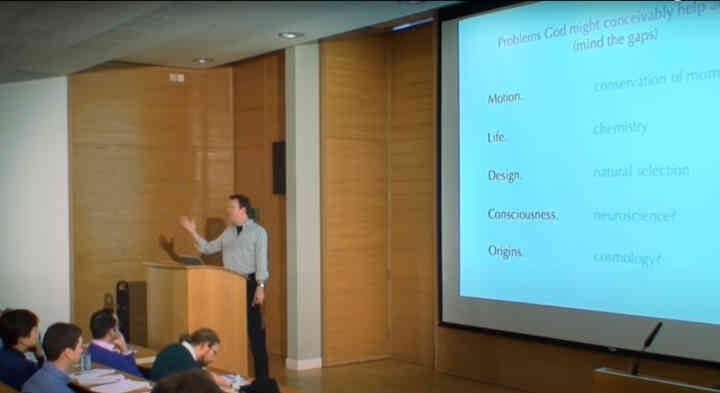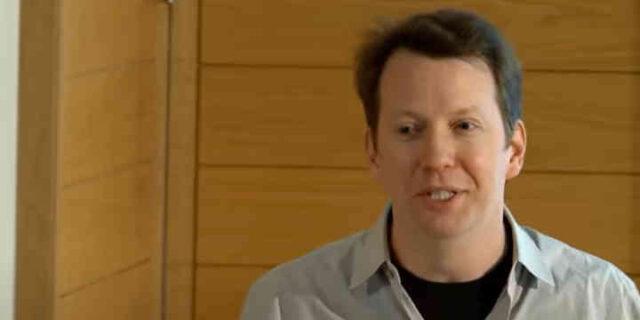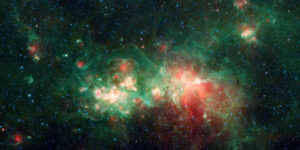Can God’s existence be demonstrated from physical evidence? Is this the best way to know God?
A reader sent me an old (2013) video by cosmologist Sean Carroll, where he argues that “God is not a good theory“. But he didn’t convince me. Read on to find out why.
Why take notice of Sean Carroll?
I rather like Sean Carroll. He may be my favourite public atheist. He speaks well. He is thoughtful. He is fair-minded. He is polite and generous in his treatment of God-belief, even while disagreeing.
Sean is Research Professor of Theoretical Physics at the California Institute of Technology, an eminent cosmologist and an active but friendly atheist. So when he speaks on science, especially cosmology, his ideas are worth listening to. He also seems to be well-read on philosophy, but there I think his assumptions and arguments let him down.
Why Sean thinks God isn’t a good theory
Sean says that some ideas about God play the role of a scientific theory – making predictions and explaining things – and therefore should be assessed and judged just like any scientific theory.
So he looks at the sorts of aspects of our universe that God might be seen as the best explanation: motion, life, design, consciousness and origins. He gives brief, and to my mind totally inadequate, answers to four of these. For example, he mentions the old argument from Thomas Aquinas that God is the best explanation of motion, and suggests that conservation of momentum explain motion. But of course it doesn’t explain how motion started in the first place. He is honest to admit that neuroscience hasn’t yet explained consciousness, but believes it will be able to some day.
He addresses one aspect (origins) in detail because that may be the most persuasive argument for God, and it also concerns cosmology, which of course is his area of expertise.

He discusses the origin of the universe, and admits that without God it is difficult to see what could have caused the universe. But, he says, maybe the universe just is, it happens to exist without a cause, and who says a cause is needed? He argues that just because everything we know of in the universe has a cause, it doesn’t mean the universe as a whole has to have a cause.
He explains the “fine-tuning” of the universe – the fact that, against all probability, the cosmic laws and parameters seem to be very precisely set to allow galaxies, stars and planets to form and life to evolve. This scientific fact is the basis of an argument that a designer is the only explanation, which he admits may be the strongest theistic argument.
He suggests that the logical alternative is the multiverse – the hypothesis that our universe is one among zillions of universes, most of which are inhospitable to life. He then uses Bayesian probability concepts to compare the two theories. Bayesian probability assessment is dependent on the prior probability of each theory (that is, how reasonable we think they are before we look at the empirical evidence) and the ability of the theory to predict the evidence.
His argument is that both of these favour the multiverse hypothesis:
- You might think that a multiverse of 10^500 separate universe is an amazing concept and inherently improbable. But Sean argues that it is a conclusion of just a few scientific hypotheses and therefore the prior probability is not low at all. On the other hand, he says the idea of God is not a natural concept at all, and therefore the prior probability of God is lower. He ignores the fact that the majority of people in the world have found the idea of God quite natural and believable.
- Likewise, because the multiverse follows from some interpretations of the cosmological evidence we have, he says the multiverse theory fits the evidence (ignoring that this was the same argument he used for the prior probability, which doesn’t seem right). On the other hand, he argues that the universe is far more fine-tuned (e.g. the low entropy beginning of the universe) and far, far bigger than is needed for life to occur, which is unexpected if God created it. So again, the multiverse wins. There are some serious problems with his argument here, which I’ll come back to later.
He finishes with a brief mention of evil and suffering in the world, and the lack of clear instructions from God on what he expects of us, arguing that these two count against the theory of God. These are (I think) his strongest arguments and he only touches on them briefly. He doesn’t discuss, for example, whether the concept of “evil” has any objective meaning in a universe without a moral God.
Some problems with his arguments
I have seen some serious criticisms of Sean’s arguments, but I want to just focus on a few major issues.
Competing hypotheses?
Sean discusses the fine-tuning argument as if the two theories (God and the multiverse) are competing. But few theists would see it this way. Even if he could prove the multiverse is true (which he admits he can’t, and it may never be provable), this doesn’t show God doesn’t exist. The two are not mutual exclusive or opposed. God could have created the multiverse.
Other physicists such as Paul Davies and Luke Barnes have pointed out that if the multiverse exists as postulated, it too had to be finely-tuned to deliver all those zillions of universes all with different properties and laws. Paul Davies: “Far from doing away with a transcendent Creator, the multiverse theory actually injects that very concept at almost every level of its logical structure.”
God should not be seen as an alternative theory to science, but as an explanation of science. Whatever science has discovered about our universe, it is reasonable to ask, why is it like that? Is theism or atheism/naturalism the better explanation?
It seems to me that this is a common mistake of atheists – to equate naturalism with science. But if a theist accepts the science (as I do), then both theism and naturalism can be judged by how well they explain the science.
Sean doesn’t consider how the multiverse got there and why it follows laws that lead to the universe we see. But if there is a multiverse, the argument about origins starts there. And just like for our own universe, theism offers an explanation for the multiverse whereas naturalism doesn’t.
No explanation for the origin of the universe?
Sean, like other atheists I have read, says he is quite comfortable with not knowing any cause for the universe, and in fact with there not being any cause. But this concession seems to me to leave his argument fatally flawed.
- It may be true that just because everything in the universe has a cause doesn’t prove the universe as a whole has a cause, but surely it is an obvious conclusion? Has he any cogent reason to think that it may not, apart from his atheism? I didn’t see one.
- If we couldn’t extrapolate from the components of the universe to the universe itself, then it would seem that a lot of what cosmologists say about the universe as a whole would also be poorly-based speculation.
- As he himself says, we judge theories by their explanatory power. A theory that explains nothing and predicts nothing, is a poor theory. So on this basis, his god-less theory of origins is very poorly based as it explains nothing. Creation by God clearly explains something that he cannot explain, and must therefore be a better theory. Of course it isn’t a scientific theory as it doesn’t explain how God did it, but it does provide a cause.
Problems with his multiverse arguments
The multiverse concept faces significant scientific problems
Sean gives the impression that the multiverse is quite likely, a reasonable conclusion from established cosmology. But other cosmologists don’t agree. Some think it is impossible. Others think it is pseudo science because other universes can never be observed or verified. Geraint Lewis and Luke Barnes say there are many difficulties with the concept that haven’t been resolved yet. Paul Davies has said as he considers the theory: “more and more must be accepted on faith, and less and less is open to scientific verification.”
These issues are unresolved. Some say that, granted the apparent fine-tuning of our universe, a multiverse is more probable than a single universe. Others contest this conclusion and argue this is a fallacy. Still others say they can avoid the fallacy. Finally, many argue that it is impossible to predict anything from an infinite multiverse.
Luke Barnes says: “I stress these points to combat glib appeals to modern physics and cosmology as having established, or even produced a coherent model of, the multiverse.”
So it seems that Sean may have overstated the scientific basis for the multiverse, and thus both its prior probability and “evidential probability”.
All things are possible?
The multiverse has to be enormously large to explain the fine-tuning of our universe – some say it contains at least 10^500 universes, others say it is infinitely large! But a large multiverse makes it likely that many, many civilisations might have evolved, some of them clever enough to create universe simulations. A consequence of the multiverse is that it is more likely we are part of a computer simulation than actual being alive. Yet very few really believe that.
And in an infinitely large eternally existing multiverse, perhaps anything that can possibly happen will happen? Critics say this means many bizarre outcomes. One such outcome is Boltzmann Brains, named after Austrian physicist Ludwig Boltzmann. In an infinite universe, it is argued, it is more likely for a single brain to spontaneously and briefly form (complete with a false memory of having existed in our universe) than it is for the universe to have come about as the result of a random fluctuation in a multiverse.
I doubt anyone takes seriously that they are a Boltzmann brain, but this reductio ad absurdum argument aims to show that the multiverse concept is useless as an explanation.
Explaining the apparent fine-tuning of the multiverse
I’ve mentioned this already. If a multiverse can produce 10^500 (or more) universes, all with varying laws and features, then it seems it must also be finely tuned. Inflation, the rapid expansion of space-time at the beginning of the big bang, is a much studied cosmological theory that has many versions, none of which are yet established. Some inflation theories predict the formation of new universes. But inflation theories require certain parameters to take on particularly precise values, which appears to be fine-tuning at a deeper level.
Luke Barnes: “Maybe a life-permitting multiverse requires fine-tuning of its parameters. We don’t know.”
Fine-tuned for life?
Sean argues that life may be much more resilient than we assume, so we cannot know what conditions are required. But Paul Davies points out that the argument is “not so much that the Universe is fine-tuned for life; rather it is fine-tuned for the building blocks and environments that life requires.”“.
Of the almost infinite number of universes allowed by theoretical physics, the vast majority have no chemistry beyond hydrogen and helium, or no structure (solid solar systems), or no stable atoms at all, and so on. Since Carroll doesn’t believe in spiritual beings, he can only be thinking of physical life, and it requires structure, chemistry and stability. Few possible universe would support anything complex enough to think and observe.
This raises another point. We exist, that is a given. So the argument can be stated as how likely is it that the universe we exist in has these parameters? It doesn’t matter if life could have arisen in a completely different form. The highly improbable values of universal parameters in “our” universe demands an explanation.
Why so big, so fine-tuned?
Sean maintains that the universe could have been much smaller than it is, and could have begun with higher entropy than the amazingly low entropy state it began. God, he says, could have just created our solar system and nothing else. What we have seems weasteful and unnecessary, and makes God less likely.
Scientifically, the universe needs to be quite large or else it wouldn’t have lasted almost 14 billion years so far, and so wouldn’t have allowed time for the solar system to form and life to evolve. That’s according to known physics. But of course it may well be true that God “could” have done it differently, using different physics.
But what would Sean know about God’s purposes? What would I know? We are just guessing.
There are many possibilities. There may be some value in the present physics. Maybe there is other life elsewhere. Maybe God wanted us to see how powerful he is. Maybe he did it just for fun, or to give us something to explore and enjoy. Who knows? If God is all-powerful, creating one planet or a zillion galaxies are both easy.
This seems to me to be a really bad argument. As a scientist, Sean needs at least to tell us the basis of his expectation of what God might or “should” do. Without that, the argument goes nowhere.
Conclusion
This video records a very well presented talk by a knowledgable and persuasive speaker. It raises many interesting points.
But as I’ve tried to outline, some of his apparently most important arguments have serious flaws. He appears to have overstated the scientific consensus and the probability of a multiverse. He has made unjustified assumptions about God. And he has admitted that his preferred hypothesis cannot explain the most fundamental fact about the universe – that it exists.
This is well presented scientific and atheist reasoning, yet it fails to convince on several key points. All this without considering other theistic arguments like the argument from reason, the moral argument and human experiences of God.
I leave the video more convinced about God’s existence, not less.
But as I said at the start, I also leave with great respect for Sean as a person and as a scientist. I just happen to think he is mistaken in his philosophy.
References
- God is not a Good Theory. Sean Carroll. Youtube, 2013.
- Is God A Good Theory? A Response To Sean Carroll, Part 1 and Part 2. VJ Torley, Uncommon Descent, 2013. Note: I am not a supporter of Uncommon Descent or the Intelligent Design movement, but I found this analysis helpful.
- Luke Barnes: Good God! (Inference, 2016) and A Reasonable Little Question: A Formulation of the Fine-Tuning Argument (Ergo Journal of Philosophy, 2020).
- Unbelievable? Does God or Naturalism best explain the Universe? Sean Carroll vs Luke Barnes. Unbelievable with Justin Brierley. 2017. An hour plus radio discussion.
- A Fortunate Universe: Life in a Finely Tuned Cosmos. Geraint F. Lewis, Luke A. Barnes, 2020. The best book I have read on the subject, by an atheist and a theist who are both astrophysicists.
Further reading on this site
- Why believe in God?
- Was the universe designed for us?
- Cosmology and God – the latest news. A review of the radio discussion between Sean Carroll and Luke Barnes.
- Book review: A Fortunate Universe.
Photos taken from the video God is not a Good Theory (Sean Carroll)




